Interesting social sciences/Ethics
Ethics.
English subtitles exist in this video. What is good and what is bad? Meaning of life. Socrates, Diogenes, Aristippus,, Buddha. The purpose of life is freedom, bodily enjoyment, not to fall into despair under the blows of fate, or to get rid of the thirst for life through meditation. In my opinion, it is necessary to achieve victory in conflicts for power and wealth at any cost.
Friedrich Nietzsche. Notes of a madman.
English subtitles exist in this video. Blond bestia.Blond bestia.
Existentialism about the meaning of life.
Jean-Paul Sartre is on the cover. . English subtitles exist in this video.
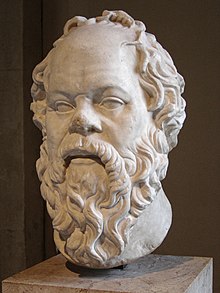



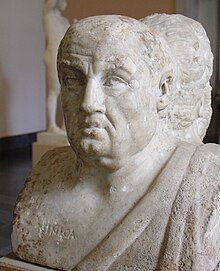
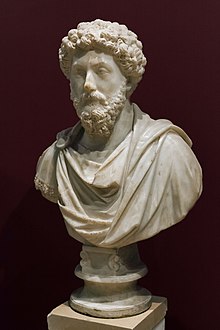
Socrates as founder of ethics
[edit | edit source]Socrates's biography
[edit | edit source]Socrates lived in Ancient Greece, in Athens. Years of his life: 469-399 BC. His father was poor and his father worked as the sculptor. Therefore Socrates was a supporter of democracy. Socrates was a psychologist on personality type, as well as all creators of ethical doctrines – Antisthenes, Diogenes, Aristippus and Gautama Buddha were psychologist on personality type. Socrates wasn't able to earn money on life therefore his wife scolded him often, but Socrates was indifferent to it, as to an eternal creak of wheels. Socrates didn't charge a fee from pupils for own lectures therefore Socrates had many pupils - Plato, Antisthenes, Aristippus and others. Socrates liked to go to workshops and the market, to ask all on what bad or good happened in the house at them, and Socrates liked to teach all people how it is necessary to live by the principle: if you aren't able to live itself, then it is necessary to teach others. Socrates said in the market that he sees here many things without which it is possible to live. People beat and kicked of Socrates for his sermonizing often, but Socrates didn't take offense as, according to him, it is silly to take offense at donkeys. Socrates was engaged in physical exercises, Socrates conducted a healthy lifestyle and Socrates had good health. Socrates participated in two unsuccessful campaigns of Athens against Sparta where Socrates has proved to be as the firm fighter under retreat of Athenian army.
Death of Socrates
[edit | edit source]Many philosophers compared heroic death of Socrates with death of Jesus Christ. Some people envied wisdom of Socrates therefore this people have accused of Socrates once that Socrates doesn't honor gods and that Socrates brings up youth incorrectly. Trial has sentenced of Socrates to death on this charge. Socrates behaved defiantly in trial and Socrates asked to sentence him instead of an execution to participation in a lunch at their expense. Almost all his pupils went to Socrates in prison and this his pupils persuaded of Socrates to make escape from the city, but Socrates has refused because Socrates was too old for escapes, Socrates was 70 years old already. Besides Socrates believed in afterlife where it will be possible to talk with souls of wise people. Socrates has told to pupils the farewell speech before death, and then Socrates has drunk poison. His pupil Antisthenes have revenged for Socrates, Antisthenes pointed out to the visiting young men attracted by the glory of Socrates on Socrates 'accusers and Antisthenes said that Socrates's accusers had surpassed of Socrates in wisdom. It has caused such indignation of residents of Athens that one accuser of Socrates was executed, and another accuser of Socrates was expelled from the city.[1]
Ideas of Socrates
[edit | edit source]Socrates was strong in rhetoric (science about eloquence). Socrates has taught to this art of own best pupil Platon who wrote the works in the form of dialogues for this reason, and Plato's pupil Aristotle has generalized this art and Aristotle has created formal logic as an example of antique wisdom. Socrates as understood the first that the physical philosophy doesn't interest of ordinary people therefore Socrates has created new branch of philosophy – ethics as science about customs and virtue, as science of what is good and what is bad. [2]
Question: Why do people do bad things?
Socrates's answer: Because people haven't been explained that it is bad, that it does not need to be done.
The correct answer which was formulated by Aristotle: Socrates was wrong, because criminals and quick-tempered people know that it does not need to be done, but they do it against all explanations. Quick-tempered people do bad because they can't contain their emotions. And criminals commit the crimes because criminals were brought up in criminal group where another criminals have inspired them that to commit crimes is good, criminals were under the influence of a criminal counterculture, or a criminal was born as thief.
The purpose of life, according to Socrates is a moral self-improvement. The dispute has erupted between followers of Socrates about meaning of life and the purpose in life. This dispute doesn't cease till today. Pupils of Socrates – Antisthenes and Aristippus – answered exactly the opposite on question about purpose of life.
“Cynics”
[edit | edit source]The main idea of Cynicism is to make free itself.
“Cynics” is a contemptuous nickname of representatives of philosophical school of pupils of Antisthenes; this nickname is translated as “dog-like”. “Cynics” had received this nickname for despicable lifestyle. The main idea of Cynicism: that to become by free and happy, it is necessary to reduce own needs before the minimum level. Example for imitation for Diogenes of Sinope was life of mouse, which does not need in bed, mouse doesn’t afraid of dark and mouse doesn’t search imaginary pleasures.[3]
Biography and main ideas of Antisthenes
[edit | edit source]His years of life were about c. 445 – c. 365 BC. Cynics were witty people therefore their many sayings have comical character. On a question what woman it needs to be taken in wives – beautiful or ugly, Antisthenes has answered: "If you marry on handsome woman, then she will be common property; if you marry on an ugly woman, then she will be a punishment for you". Antisthenes was asked on one occasion what learning was the most necessary, and he replied, “To unlearn one’s bad habits.”. A young man from Pontus once promised to award of Antisthenes, when a vessel with salt fish arrived; therefore Antisthenes took this young man and an empty sack, and Antisthenes went to a woman in market who sold meal, and Antisthenes filled his sack and went away; and when the woman asked him to pay for it, Antisthenes said, “The young man will pay you, when the vessel of salt fish comes home.” Antisthenes has died from tuberculosis, and the tuberculosis often is result of bad food and life in the crude room, apparently, such death is a payment for freedom in his understanding.[4] [5]
It is possible to draw a conclusion that Antisthenes has died for the sake of the idea. while Antisthenes was ill, Diogenes of Sinope came to see of Antisthenes with a sword in his hand; and when Antisthenes said, “Who can deliver me from this suffering?” Diogenes of Sinope, pointing to the sword, said, “This can;” But Antisthenes objected, “I said from suffering, but not from life;” Antisthenes only was limited by calls to a simple lifestyle, but his follower Diogenes of Sinope became sample of cynical wisdom and Diogenes of Sinope brought these advice to life.
Diogenes of Sinope reduced of own needs to minimum, in fact Diogenes of Sinope was an ideological homeless tramp and trained beggar. Diogenes of Sinope did not have own house in Athens, therefore Diogenes of Sinope decided to live in clay cask “as Gin”. Diogenes of Sinope hardened own body with help of cold and heat, because there can be no of heating in the clay cask, but temperature of air falls below 0th degrees Celsius in winter in Greece often. Diogenes of Sinope cuddled to cold bronze statues in winter, Diogenes of Sinope sunbathed on the heated sand in summer with aim of hardening for own body. Diogenes of Sinope ate waste from the town’s market and Diogenes of Sinope asked the alms. Diogenes of Sinope asked the alms at bronze statue once; and being questioned as to his reason for doing so, he said, “To accustom yourself to refusals.”
Main ideas of Diogenes of Sinope
[edit | edit source]Diogenes of Sinope: freedom as life purpose.
Once Diogenes of Sinope attempted to eat raw meat, but he could not digest it. Diogenes of Sinope slept on their cloak and Diogenes of Sinope carried the bag everywhere and Diogenes of Sinope store food in bag. Any place was suitable for Diogenes of Sinope for food, sleep and conversation. Diogenes of Sinope related to all people with venomous contempt. One rich man brought of Diogenes of Sinope to visit and this rich man did not allow to Diogenes of Sinope to spit on the carpet, therefore Diogenes spat in his face and Diogenes said that he could not find a worse place. Plato said that Diogenes of Sinope is a mad Socrates. Once, while Diogenes of Sinope was sitting in the sun in the Craneum, Alexander the Great was standing by, and said to him, “Ask any favour you choose of me.” And Diogenes of Sinope replied, “Cease to shade me from the sun.” [6] [7]
Hedonism
[edit | edit source]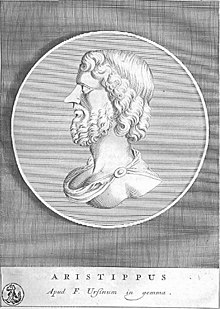
Aristippus: corporal pleasures as life purpose.
Aristippus's biography
[edit | edit source]Aristippus was born in the city of Cyrene, the Greek colony on the African coast in Libya. Years of his life: 435-356 BC. Aristippus, actually, was an ideological footman. Aristippus was able to adapt to any person, playing own role in accordance with the situation. Aristippus lived at the palace of the tyrant Dionysius I of Syracuse, for this Diogenes of Sinope called of Aristippus by "the royal dog". Dionysius I of Syracuse was that tyrant who has sold of Plato in slavery. Aristipp looked for all the pleasures available to him. [8]
Aristippus's sayings
[edit | edit source]Often the tyrant spat at Aristippus, and Aristippus endured these bullying. People began to laugh at Aristippus, and Aristippus said: "Fishermen suffer a splash of the sea for the sake of small fish, and I want to catch a goldfish" (magic fish from the fairy tale of Alexander Pushkin and the brothers Grimm, this magic fish could fulfill any wishes of the fisherman who caught her). Once Aristippus crawled on his knees in front of a tyrant Dionysius I of Syracuse, people began to laugh at Aristippus and Aristippus exclaimed: “It is not I who am to blame, but Dionysius who has his ears in his feet.” One day Aristippus asked Dionysius I of Syracuse for some money, Dionysius I of Syracuse said, “But you told me that a wise man would never be in want;” “Give me some,” Aristippus rejoined, “and then we will discuss that point;” Dionysius gave him some, “Now then,” said he, “you see that I do not want money.” Once Diogenes of Sinope, who was washing vegetables, ridiculed of Aristippus as passed by, and Diogenes of Sinope said, “If you had learnt to eat these vegetables, you would not have been a slave in the palace of a tyrant.” But Aristippus replied, “And you, if you had known how to behave among men, would not have been washing vegetables.” [9]
Eudaimonism
[edit | edit source]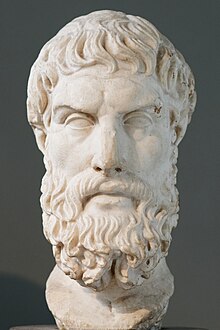

Biography of Epicurus
[edit | edit source]Years of his life:341–270 BC. Epicurus has arrived to Athens in 306 BC and Epicurus founded the school which has received the name "Epicurus's Garden", hence the name of epicureans is "philosophers of the Garden". Saying hung over an entrance to the Garden : "Stranger, you'll be fine here; here our highest good is pleasure". Epicurus had poor health. Epicurus called to pleasures only in words, and actually Epicurus ate, generally bread and water only, and Epicurus considered cheese and wine as seldom available luxury. [10]
Ideas of Epicurus
[edit | edit source]Epicurus: the purpose of life is a rest and satisfaction of elementary needs. According to Epicurus, Gods live in interworld space without influencing on fate of people in any way. Subsequently, Epicurus was accused of atheism for these words repeatedly and after the Christianity became the main religion in Europe, works of Epicurus were forbidden to the publication for a long time. According to Epicurus, pleasure consists in maintaining of peace of mind, satisfaction of natural and necessary needs, pleasure leads at first to achievement of peace of mind ("ataraxia"), and then to achievement of happiness ("eudaimonia").
Subsequently, Epicurus's philosophy has received in ordinary consciousness strongly simplified interpretation — the epicurean is the one who seeks to learn all pleasures of life, without stopping before anything, for the sake of receiving corporal pleasures. However such understanding of theory of Epicurus has nothing in common with Epicurus's ideas.
Fears prevent to person to find entire happiness therefore the person has to overcome these fears. Epicurus approved senselessness of fear before death because afterlife don't exists, a human soul, being material, is mortal as well as a body, so it isn't necessary to torment itself with thoughts about that will be after death. Epicurus appreciated highly pleasures of private life. Epicurus called for conscious refusal from public life. This words became by motto of epicureans: "The wise man will try to live unnoticed". The Roman philosopher Lucretius has informed us about many thoughts of Epicurus in the poetic work "On the Nature of Things".[11]
The main schools and the directions in Ancient Greek ethics:
[edit | edit source]Asceticism as limit restriction of own needs. Cunics were ascetics.
Hedonism, as aspiration to corporal pleasures. Pupils of Aristippus were supporters of hedonism.
Eudaimonism, as aspiration to happiness. Epicureans were supporters of eudemonism.
Conclusion: the ordinary person has to seek to have little of freedom and little of corporal pleasures, but at the same time ordinary person shouldn't be humiliated as Aristippus and not to beg as Diogenes of Sinope. It isn't necessary to aspire to these extremes. Therefore Epicurus was closest to the truth about the purpose in life, but I don't accept passivity in lives and asceticism of Epicurus. The person has to struggle with other people and to win in fight for wealth, prestige and the power. Our society is constructed on the conflicts and control where "the strongest survives", and it is impossible to hide in "Garden of Epicurus" from this fact. Diogenes from Sinope didn't want to participate in struggle for power and wealth inevitable in society. [12] In my opinion, if man don't wish to participate in conflict for power and wealth under the pretext of preservation of personal freedom, that this man dooms itself beforehand to beggarly and miserable existence. Therefore, most people are forced to participate in conflicts, to fight for power and wealth, to be by controller or object of control.
Ethics of Stoicism
[edit | edit source]Course of world events not depends from the will of human beings. As Seneca the Younger said: "It is foolish to make plans for life without being sure in tomorrow". External freedom of the person consists only in cooperation with destiny. Seneca the Younger said: "Fate leads the willing and drags along the reluctant". The main thought of Stoicism: “When the Roman Empire fell and strokes of fate poured on the person, the person had not to fall into despair, but the person has to keep internal calm because nobody could prevent these cataclysms of history”.
Representatives of stoicism: Zeno of Citium, Seneca the Younger, Roman emperor Marcus Aurelius.[13]
Conclusion: I agree that it is necessary to keep calm and not to fall into a hysterics during defeats, but it is even better simply to be able to win in course of conflict. Otherwise, maintaining calm in the course of defeat can be perceived by others as a good facial expression at a bad game.
Four noble truths in ethics of Buddhism:
[edit | edit source]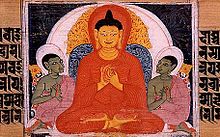
- Life is suffering. The birth, an old age, a disease, death – all this is suffering.
- The reason of suffering is a thirst of life, thirst of pleasure, thirst of death bringing to all to new rebirth.
- It is necessary to get rid of this thirst of life.
- That to get rid of thirst of life it is necessary to be engaged in meditation, that is self-hypnosis.
It is necessary to reach of a state of complete calm and indifference, Gautama Buddha named this state as nirvana. This word comes from the word "to extinguish fire", "pleasure", "eternal rest", "rescue from the cycle of rebirth" Nirvana is an exit from a circle of rebirth, from circle of suffering.
Conclusion: despite all advantage of a religious consolation, it is possible to be sure that the supporter of the Buddhism is inevitably doomed to defeat in course of conflict because the supporter of the Buddhism has no combative qualities and desire for victory completely. The belief that life is suffering - it is conviction of the loser. In my opinion, life is fight for existence.
Ethics of Friedrich Nietzsche
[edit | edit source]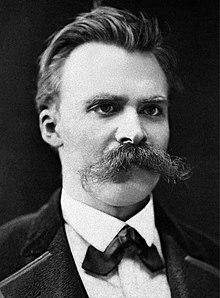
Biography. of Friedrich Nietzsche
[edit | edit source]Years of life of Friedrich Nietzsche: 1844-1900. He lived in Germany.
It is possible to find in his biography the following inclinations which are characteristic of psychologists as the personality type:
- literary talent and brilliant poetic style of compositions in the form of aphorisms,
- interest to ancient art, to Wagner's music:, figurative thinking, Friedrich Nietzsche composed music and Friedrich Nietzsche wrote verses in the childhood.
- inclination to social utopias, dreaminess.
Friedrich Nietzsche have inherited from the father bad health. Friedrich Nietzsche was pursued severe headaches already in the childhood and during all life (there were no means to remove them), the disease of eyes bringing almost to a blindness. These diseases forced him "to stand one leg in a grave". Friedrich Nietzsche went mad in 1889 completely, when all his works were published already. Friedrich Nietzsche was follower of Arthur Schopenhauer. The reading public treated his scientific creativity indifferently during Nietzsche 's life. Similar concealment depressed of Friedrich Nietzsche strongly. Friedrich Nietzsche found hardly of publishers for own books. However the public began to consider of Friedrich Nietzsche as one of the most great philosophers of 19 century after his Nietzsche's death.[14]
"The blond beast"
[edit | edit source]"The blond beast " is an image of the born aristocrat which all is allowed in fight for power – political murder and the armed seizure of power. Life is a fight for power, life is fight without rules. To achieve of power over people, it is necessary to be born by "the blond beast", that is an animal predator, a monster with a lion's mane, the born aristocrat. Friedrich Nietzsche glorifies of value of the aristocracy in life of society. The aristocracy conducts of people from a victory to a victory on the world-wide historical arena. At the centre of all these noble races we see the beast of prey, luxurious wandering in search of prey and victory blond bestia, which for the sake of rest either hides in thickets, then again enters the historical arena. The blond beast – Roman, Arabian, Germanic, Japanese nobility, Homeric heroes, Scandinavian Vikings. [15]
Friedrich Nietzsche denies benefit of morals and religion for the blond beast
[edit | edit source]The blond beast is a superman. The blond beast places themselves beyond good and evil.[16] The blond beast have to be above morals and religion. The moral law isn't written for the blond beast. The blond beast can break laws of morals and religious standards of behavior. It is allowed for superman to commit any crimes in fight for power. Friedrich Nietzsche considered that morals and religion are harmful for mankind because it tame of man-beast with help of morals and religion [17], as in cage of a menagerie. It turn of blond beast to a sick beast with help of use of the repressive mechanism of fear, a beating, hunger and pain. The Christian reminds the sick, pathetic, embittered on himself beast in a cage who hates all strong and happy around. Hunting exested for the finest individuals of "the blond beast " everywhere in the early Middle Ages when the church was, in effect, the menagerie, because church tamed of the noble Teutons. [18] "The Christianity is an anti-Aryan religion", the Christianity is the generation of Jewish soil .[19]
Breeding of aristocratic human breed
[edit | edit source]Friedrich Nietzsche was one of Adolf Hitler's teachers. Adolf Hitler considered of Germans as race of masters and Adolf Hitler have proclaimed policy of racial hygiene, that is policy of artificial selection and extermination of untermenschen, that is Jews, Roma, and Slavs – mainly Poles, Serbs, and later also Russians in gas chambers and concentration camps. Adolf Hitler considered physical extermination of Jews as final decision of a Jewish problem. Friedrich Nietzsche wasn't so categorical and Friedrich Nietzsche called a caste system as an example for imitation as a way of the breeding of a highest race. [20] The caste system in India were constructed on the basis of religious laws of Manu. Here the task is set, to breed four breeds of people, four castes and to struggle against not purebred people – "chandala" (untouchable people).[21]
Critical relation of Friedrich Nietzsche towards democracy
[edit | edit source]"The blond beast", the superman shouldn't be afraid of solitude because fear of solitude is a herd instinct [22]. According to Friedrich Nietzsche, democracy was always the declining form of organizational force. Friedrich Nietzsche glorified of cruel will and the absolute power of the monarch. When such power exist, then great empires like the Roman or Russian Empire appear. Friedrich Nietzsche considered of Russia as only strong and durable imperia from which much can be expected. Russia is an antipode of wretched European fragmentation and nervousness. [23]
Сriticism of the ideas of Friedrich Nietzsche:
[edit | edit source]In my opinion, the place of "blond beast" is in prison because it is necessary to subject to criminal prosecution for murder and the armed seizure of power of any citizen irrespective of whether he considers himself as born aristocrat or not. Political murder of the ruler and the armed seizure of power were admissible under tyranny, but the free multi-party elections are only admissible way of fight for power after an invention and establishment of representative democracy. Representative democracy is better than tyranny.
The second mistake of Friedrich Nietzsche consisted in denial of benefit of religion and morals. All people have to observe laws of morals, people feel contempt to violators of these laws and people apply moral sanctions to this violators. For example, activity of political tyrants and usurpers of the state power causes moral censure. The benefit of religion consists in upbringing and a consolation of people. The caste system can't be an example for imitation for modern society because the caste system is constructed on a powder keg, that is the caste system is pregnant by revolution and a rebellion. The caste system switches off process of vertical mobility and the caste system limits legal forms of the conflict for the power, wealth and the social status between representatives of the highest and lowest castes unreasonably that leads, on the one hand, to a rebellion of the lowest castes, and, on the other hand, to degeneration of the highest castes.
Existentialism about inner world of the person, about internal freedom and responsibility of the personality
[edit | edit source]
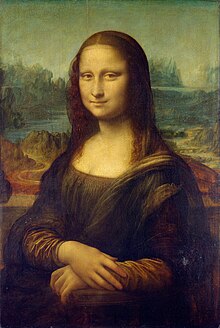


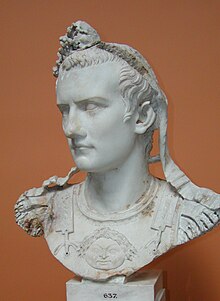

Existential philosophy (from the English word - "existence") was developed of such European thinkers and writers as Søren Kierkegaard (1813-1855), Karl Jaspers (1883-1969), Martin Heidegger (1889-1976), Jean-Paul Sartre (1905-1980), Albert Camus (1913-1960). All of them were by psychologists as the personality type far from needs of real life.
The peak of influence of existentialism falls on years after the end of World War II and proceeds until the end of the 60th. The existentialism was the most influential direction in philosophy at that time among the studying youth and representatives of humanitarian professions – writers, actors, artists. The influence of existentialism began to fall rapidly after a wave of left-wing youth movements rocked of Europe in the 1960s. Jean-Paul Sartre, for example, participated in youth demonstrations directly and Jean-Paul Sartre was as peculiar live flag for youth. The Minister of Internal Affairs asked from the President of the country Charles de Gaulle about the sanction for arrest of the aged and sick rebel Jean-Paul Sartre, but The Minister of Internal Affairs has received the worthy answer from Charles de Gaulle: France does not arrest Volters!.
From the point of view of existentialism, each person is unique, completely internally free and independent. Difficult destiny of person – to be always in way to finding of the meaning of life in this absurd senseless world. The existentialism rejects dependence of the person from equipment and economy. The protest was expressed in existentialism against timeserving of philistines who became by "small screws" of bureaucratic machinery. The true meaning of life opens to the person during the periods of the deepest shocks, before the face of death, a serious illness, not washed away guilt when the world of his deeply intimate existence opens before him. Each person bears by responsibility for own actions.
It is possible to explain the difficult philosophical ideas of existentialism on the basis of stories and novels of Albert Camus. This philosopher was born in the French colony – Algeria. Albert Camus has died during road accident. Names of his best-known works is "The Stranger", "The Myth of Sisyphus", "The Misunderstanding", "The Plague", "The Rebel", "The Fall ". The views of Albert Camus developed in conditions when the faith in God and in immortal soul is lost and it has become clear that the person is expected destruction after death. Thus, the person has lost meaning of life. His hero Meursault in the novel "The Stranger" is a small employee who is absolutely indifferent to own career, to own mother, to own wife. But Meursault is sincerely in love with the nature – to the sea, to the air and to the sun. This monotonous life was broken once. Meursault kills of Arab on the seashore from a revolver for no reason at all. Meursault is unanimously sentenced to death in court because Meursault isn't similar at all to philistines who judge him. Meursault is indifferent to the verdict of the court. If we are doomed to death, that life makes no sense - here 's main thought of Meursault. [24]
The same thought repeats in the novel "The Myth of Sisyphus". Gods have sentenced of Sisyphus to useless work. The fate of today's worker reminds Sisyphus's fate. If the person has to die whether then it is worth living? The question about suicide is the most important philosophical question in existentialism. We carry out the monotonous and boring duties day by day at work and at home as automatic machines, but a question arises once: "Why I need it?". After that consciousness wakens that leads either to suicide, or to recovery.[25]
Accoding to the play of Albert Camus "The Misunderstanding" action happens in the hotel located in mountains. Affairs is run in this hotel so that the hostess of hotel and its daughter kill and plunder by all rich lodgers whom has managed to stay at their hotel. The hostess's son was their victim once, this son wasn't at home many years . The daughter of the hostess has managed to convince of wife of the killed son that if each person is doomed to death, then it isn't important when this death comes.[26]
The fate of tyrant is represented in the play "Сaligula". Caligula was very decent young man in the beginning of his life, but the sudden death of Drusilla, his sister and lover changes his character sharply. The despair opens for him the truth that no truth, the good and evil don't exist in this world therefore Caligula is free to do anything because the power of the emperor is boundless. Caligula begins to create an arbitrariness and wild abuses over people. Caligula was killed by conspirators after several years of his ruling. Caligula understands before death that he has chosen not that way, "because it is impossible to be free against other people". [27]
Accoding to the novel "Plague" the scene of action is the city of Oran where plague epidemic flashes. Troops isolate the city from the outside world. Small group led by doctor Bernard Rieux begin fight against plague. The priest of local church announces of plague as God's penalty and the priest calls to humility. At last, epidemic of plague begins to recede, but epidemic of plague will arise again sometimes.[28]
Conclusion: The existentialism has raised a problem of meaning of life and admissibility of suicide under the absence of this meaning of life. In my opinion, meaning of life consists in achieving of self-realization. According to the hero from the movie "Kidnapping, Caucasian Style!", the meaning of life consists that it need to live well. Supreme meaning of life don't exist in principle. Life is a fight on the principle "Only the Strongest Will Survive" and a natural selection exists among participants of this fight. Suicide is a capitulation of the loser or person of no character in the face of natural problems and difficulties of this fight. Suicide is the first wrong exit from vital problems. The second wrong way to get out of the fight is the use of drugs by the principle "It need die with pleasure". Therefore both suicide and drugs – it is bad.
My relation to existentialism is skeptical for such reason that this theory became substantiation for various countercultures like hippie, bohemianism and substantiation for extremism in policy. The movement of hippie has stated protest against a philistine way of life and the movement of hippie set the purpose to be closer to the nature, that is to live in a hut in the jungle of India on the ocean coast as "Flower Children", to go naked and with long hair, to use drugs and to listen to psychodelic music. In my opinion, the movement of hippie is the movement of losers who were psychologists as the personality type most often, psychologists can't find the place and a profession within a modern technical civilization and psychologists dream to return to primitive society, but it isn't possible in principle. Psychologists dream to organize a senseless revolt in policy as Albert Camus offered.
Jean-Paul Sartre flounced randomly between the different political movements – Jean-Paul Sartre adjoined to the anti-Communist Revolutionary-democratic movement (middle class), Jean-Paul Sartre has visited the USSR and Jean-Paul Sartre announced Marxism as "philosophy of our time", next Jean-Paul Sartre was fond of the Cuba's communism of Fidel Castro and Mao Zedong's ideas, Jean-Paul Sartre began to oppose against communism of the "Soviet" sample and against "eurocommunism" because the French communists were afraid to organize revolution and a revolt in France. Jean-Paul Sartre urged to organize "cultural" revolution in Europe following China's example, Jean-Paul Sartre urged to burn picture "Mona Lisa" and Jean-Paul Sartre urged to burn of professors of the universities. Thus, Jean-Paul Sartre offered many nonsense and Jean-Paul Sartre has shown the full incompetence in a political sphere.
Citations and references.
[edit | edit source]- ↑ Diogenes Laërtius. Lives and Opinions of Eminent Philosophers. BOOK II.Socrates http://www.gutenberg.org/files/57342/57342-h/57342-h.htm
- ↑ Bertrand Russell A history of western philosophy. Book one. Ancient philosophy.Part II. Socrates, Plato, and Aristotle.Chapter XI. Socrates. http://www.ntslibrary.com/PDF%20Books/History%20of%20Western%20Philosophy.pdf
- ↑ Diogenes Laërtius. Lives and Opinions of Eminent Philosophers. BOOK VI. Life of Diogenes. http://www.gutenberg.org/files/57342/57342-h/57342-h.htm
- ↑ Diogenes Laërtius. Lives and Opinions of Eminent Philosophers. BOOK VI. Life of Antisthenes. http://www.gutenberg.org/files/57342/57342-h/57342-h.htm
- ↑ Bertrand Russell A history of western philosophy. Book one. Ancient philosophy. Part III. Ancient Philosophy after Aristotle. Chapter XXVI. Cynics and Sceptics. http://www.ntslibrary.com/PDF%20Books/History%20of%20Western%20Philosophy.pdf
- ↑ Diogenes Laërtius. Lives and Opinions of Eminent Philosophers. BOOK VI. Life of Diogenes. http://www.gutenberg.org/files/57342/57342-h/57342-h.htm
- ↑ Bertrand Russell A history of western philosophy. Book one. Ancient philosophy. Part III. Ancient Philosophy after Aristotle. Chapter XXVI. Cynics and Sceptics. http://www.ntslibrary.com/PDF%20Books/History%20of%20Western%20Philosophy.pdf
- ↑ Diogenes Laërtius. Lives and Opinions of Eminent Philosophers. BOOK II. Life of Aristippus. http://www.gutenberg.org/files/57342/57342-h/57342-h.htm
- ↑ Diogenes Laërtius. Lives and Opinions of Eminent Philosophers. BOOK II. Aristippus. http://www.gutenberg.org/files/57342/57342-h/57342-h.htm
- ↑ Diogenes Laërtius. Lives and Opinions of Eminent Philosophers. BOOK X. Epicurus. http://www.gutenberg.org/files/57342/57342-h/57342-h.htm
- ↑ Bertrand Russell A history of western philosophy. Book one. Ancient philosophy. Part III. Ancient Philosophy after Aristotle. Chapter XXVII. The Epicureans. http://www.ntslibrary.com/PDF%20Books/History%20of%20Western%20Philosophy.pdf
- ↑ Diogenes Laërtius. Lives and Opinions of Eminent Philosophers. BOOK VI. Diogenes. http://www.gutenberg.org/files/57342/57342-h/57342-h.htm
- ↑ Bertrand Russell A history of western philosophy. Book one. Ancient philosophy. Part III. Ancient Philosophy after Aristotle. Chapter 28. Stoicism. http://www.ntslibrary.com/PDF%20Books/History%20of%20Western%20Philosophy.pdf
- ↑ Bertrand Russell A history of western philosophy. BOOK THREE. MODERN PHILOSOPHY.Part II. From Rousseau to the Present Day. Chapter XXV. Nietzsche. http://www.ntslibrary.com/PDF%20Books/History%20of%20Western%20Philosophy.pdf
- ↑ Friedrich Nietzsche On the Genealogy of Morality. First essay: ‘Good and Evil’, ‘Good and Bad’. 11. http://www.inp.uw.edu.pl/mdsie/Political_Thought/GeneologyofMorals.pdf
- ↑ Friedrich Nietzsche. Twilight of the Idols or, How to Philosophize with the Hammer. Those Who “Improve” Humanity. Page 38. http://www.faculty.umb.edu/gary_zabel/Phil_100/Nietzsche_files/Friedrich-Nietzsche-Twilight-of-the-Idols-or-How-to-Philosophize-With-the-Hammer-Translated-by-Richard-Polt.pdf
- ↑ Friedrich Nietzsche. Twilight of the Idols or, How to Philosophize with the Hammer. Those Who “Improve” Humanity. Page 38. http://www.faculty.umb.edu/gary_zabel/Phil_100/Nietzsche_files/Friedrich-Nietzsche-Twilight-of-the-Idols-or-How-to-Philosophize-With-the-Hammer-Translated-by-Richard-Polt.pdf
- ↑ Friedrich Nietzsche. Twilight of the Idols or, How to Philosophize with the Hammer. Those Who “Improve” Humanity. Page 39. http://www.faculty.umb.edu/gary_zabel/Phil_100/Nietzsche_files/Friedrich-Nietzsche-Twilight-of-the-Idols-or-How-to-Philosophize-With-the-Hammer-Translated-by-Richard-Polt.pdf
- ↑ Friedrich Nietzsche. Twilight of the Idols or, How to Philosophize with the Hammer. Those Who “Improve” Humanity. Page 41. http://www.faculty.umb.edu/gary_zabel/Phil_100/Nietzsche_files/Friedrich-Nietzsche-Twilight-of-the-Idols-or-How-to-Philosophize-With-the-Hammer-Translated-by-Richard-Polt.pdf
- ↑ Friedrich Nietzsche. Twilight of the Idols or, How to Philosophize with the Hammer. Those Who “Improve” Humanity. Page 39. http://www.faculty.umb.edu/gary_zabel/Phil_100/Nietzsche_files/Friedrich-Nietzsche-Twilight-of-the-Idols-or-How-to-Philosophize-With-the-Hammer-Translated-by-Richard-Polt.pdf
- ↑ Friedrich Nietzsche. Twilight of the Idols or, How to Philosophize with the Hammer. Those Who “Improve” Humanity. Page 39-40. http://www.faculty.umb.edu/gary_zabel/Phil_100/Nietzsche_files/Friedrich-Nietzsche-Twilight-of-the-Idols-or-How-to-Philosophize-With-the-Hammer-Translated-by-Richard-Polt.pdf
- ↑ Friedrich Nietzsche. The Cay Science. Book One. 50. The argument from growing solitary. Page 62. https://www.holybooks.com/wp-content/uploads/The-Gay-Science-by-Friedrich-Nietzsche.pdf
- ↑ Friedrich Nietzsche. Twilight of the Idols or, How to Philosophize with the Hammer. Raids of an Untimely Man. 39. Critique of modernity Page 75-76. http://www.faculty.umb.edu/gary_zabel/Phil_100/Nietzsche_files/Friedrich-Nietzsche-Twilight-of-the-Idols-or-How-to-Philosophize-With-the-Hammer-Translated-by-Richard-Polt.pdf
- ↑ Albert Camus. The Stranger. https://www.macobo.com/essays/epdf/CAMUS,%20Albert%20-%20The%20Stranger.pdf
- ↑ Albert Camus. The Myth Of Sisyphus And Other Essays. http://bokship.org/comingup/loveinthemorning/CAMUS_TheMythofSisyuphus_Excerpt.pdf
- ↑ Albert Camus. The Misunderstanding and Caligula http://knocklofty.com/wp-content/uploads/2007/11/camus.pdf
- ↑ Albert Camus. The Misunderstanding and Caligula http://knocklofty.com/wp-content/uploads/2007/11/camus.pdf
- ↑ Albert Camus. The Plague. https://antilogicalism.com/wp-content/uploads/2018/03/the-plague.pdf
